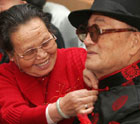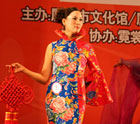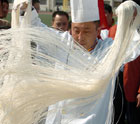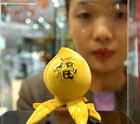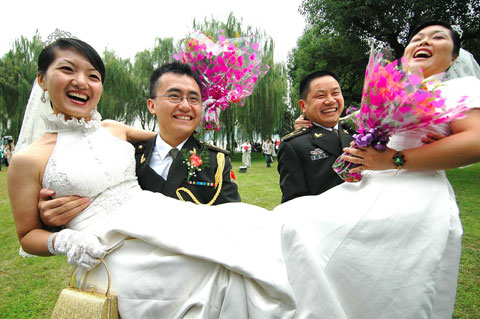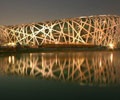Chapter II: Organization System of the Party
Article 10 The Party is an integral body organized under its program and Constitution on the principle of democratic centralism. The basic principles of democratic centralism as practiced by the Party are as follows:
(1) Individual Party members are subordinate to the Party organization, the minority is subordinate to the majority, the lower Party organizations are subordinate to the higher Party organizations, and all the constituent organizations and members of the Party are subordinate to the National Congress and the Central Committee of the Party.
(2) The Party's leading bodies at all levels are elected except for the representative organs dispatched by them and the leading Party members' groups in non-Party organizations.
(3) The highest leading body of the Party is the National Congress and the Central Committee elected by it. The leading bodies of local Party organizations are the Party congresses at their respective levels and the Party committees elected by them. Party committees are responsible, and report their work, to the Party congresses at their respective levels.
(4) Higher Party organizations shall pay constant attention to the views of lower organizations and the rank-and-file Party members, and solve in good time the problems they raise. Lower Party organizations shall report on their work to, and request instructions from, higher Party organizations; at the same time, they shall handle, independently and in a responsible manner, matters within their jurisdiction. Higher and lower Party organizations should exchange information and support and supervise each other. Party organizations at all levels should enable Party members to keep well informed of inner-Party affairs and to have as many opportunities as possible to involve themselves in them.
(5) Party committees at all levels function on the principle of combining collective leadership with individual responsibility based on division of labor. All major issues shall be decided upon by the Party committees after discussion in accordance with the principle of collective leadership, democratic centralism, individual consultations and decision by meetings. The members of the Party committees should earnestly perform their duties in accordance with the collective decisions taken and division of labor.
(6) The Party forbids all forms of personality cult. It is necessary to ensure that the activities of the Party leaders are subject to the supervision of the Party and the people, and at the same time to uphold the prestige of all the leaders who represent the interests of the Party and the people.
Article 11 The election of delegates to Party congresses and of members of Party committees at all levels should reflect the will of the voters. Elections shall be held by secret ballot. The lists of candidates shall be submitted to the Party organizations and voters for full deliberation and discussion. The election procedure in which the number of candidates nominated is greater than the number of persons to be elected may be used directly in a formal election or this procedure may be used first in a preliminary election in order to draw up a list of candidates for the formal election. The voters have the right to inquire about the candidates, demand a change or reject one in favor of another. No organization or individual shall in any way compel voters to elect or not to elect any candidate.
If any violation of the Party Constitution occurs in the election of delegates to a local Party congress or to Party congresses at the primary level, the Party committee at the next higher level, after investigation and verification, should decide to declare the election invalid and take appropriate measures. The decision shall be reported to the Party committee at the next higher level for checking and approval before it is formally announced and implemented.
Article 12 When necessary, the Central Committee of the Party and the local Party committees at all levels will convene party conferences for delegates to discuss and decide on major problems that require timely solution. The number of delegates to such conferences and the procedure governing their election shall be determined by the Party committees convening them.
Article 13 The formation of a new Party organization or the dissolution of an existing one shall be decided upon by the higher Party organizations.
The Central Committee of the Party and the local Party committees at all levels may send out their representative organs.
When the congress of a local Party organization at any level or the congress of Party organization at the primary level is not in session, the next higher Party organization may, when it deems it necessary, transfer or appoint responsible members of that organization.
Article 14 When making decisions on important questions affecting the lower organizations, the leading bodies of the Party at all levels should, under normal circumstances, solicit opinions of the lower organizations. Measures should be taken to ensure that the lower organizations can exercise their functions and powers normally. Except in special circumstances, higher leading bodies should not interfere with matters that ought to be handled by lower organizations.
Article 15 Only the Central Committee of the Party has the power to make decisions on major policies of a nationwide character. Party organizations of various departments and localities may make suggestions with regard to such policies to the Central Committee, but shall not make any decisions or publicize their views outside the Party without authorization.
Lower Party organizations must firmly implement the decisions of higher Party organizations. If lower organizations consider that any decisions of higher organizations do not suit the specific conditions in their localities or departments, they may demand modification. If the higher organizations insist on their original decisions, the lower organizations must carry out such decisions and refrain from publicly voicing their differences, but retain the right to report to the next higher Party organization.
Newspapers, journals and other means of publicity run by Party organizations at all levels must disseminate the line, principles, policies and decisions of the Party.
Article 16 When discussing and making decisions on any matter, Party organizations must keep to the principle of subordination of the minority to the majority. A vote must be taken when major issues are decided on. Serious consideration should be given to the differing views of a minority. In case of controversy over major issues in which supporters of the two opposing views are nearly equal in number, except in emergencies where action must be taken in accordance with the majority view, the decision should be put off to allow for further investigation, study and exchange of opinions followed by another vote. Under special circumstances, the controversy may be reported to the next higher Party organization for a ruling.
When, on behalf of the Party organization, an individual Party member is to express views on major issues beyond the scope of the existing decisions of the Party organizations, the content must be referred to the Party organization for prior discussion and decision, or referred to the next higher Party organization for instructions. No Party member, whatever his position, is allowed to make decisions on major issues on his own. In an emergency, when a decision by an individual is unavoidable, the matter must be reported to the Party organization immediately afterwards. No leader is allowed to take decisions arbitrarily on his own or to place himself above the Party organization.
Article 17 The central, local and primary organizations of the Party must all pay great attention to Party building. They shall regularly discuss and examine the Party's work in publicity, education, organization and discipline inspection, its mass work and united front work. They must carefully study ideological and political developments inside and outside the Party.
Chapter III: Central Organizations of the Party
Article 18 The National Congress of the Party is held once every five years and convened by the Central Committee. It may be convened before the normally scheduled date if the Central Committee deems it necessary or if more than one-third of the organizations at the provincial level so request. Except under extraordinary circumstances, the Congress may not be postponed.
The number of delegates to the National Congress of the Party and the procedure governing their election shall be determined by the Central Committee.
Article 19 The functions and powers of the National Congress of the Party are as follows:
(1) To hear and examine the reports of the Central Committee;
(2) To hear and examine the reports of the Central Commission for Discipline Inspection;
(3) To discuss and decide on major questions concerning the Party;
(4) To revise the Constitution of the Party;
(5) To elect the Central Committee; and
(6) To elect the Central Commission for Discipline Inspection.
Article 20 The powers and functions of the National Conference of the Party are as follows: to discuss and make decisions on major questions; and to replace members and elect additional members of the Central Committee and the Central Commission for Discipline Inspection. The number of members and alternate members of the Central Committee to be replaced or newly elected shall not exceed one-fifth of the respective totals of members and alternate members of the Central Committee elected by the National Congress of the Party.
Article 21 The Central Committee of the Party is elected for a term of five years. However, when the next National Congress is convened before or after its normally scheduled date, the term shall be correspondingly shortened or extended. Members and alternate members of the Central Committee must have a Party standing of five years or more. The number of members and alternate members of the Central Committee shall be determined by the National Congress. Vacancies on the Central Committee shall be filled by its alternate members in the order of the number of votes by which they were elected.
The Central Committee of the Party meets in plenary session at least once a year, and such sessions are convened by its Political Bureau.
When the National Congress is not in session, the Central Committee carries out its decisions, directs the entire work of the Party and represents the Communist Party of China in its external relations.
Article 22 The Political Bureau, the Standing Committee of the Political Bureau and the General Secretary of the Central Committee of the Party are elected by the Central Committee in plenary session. The General Secretary of the Central Committee must be a member of the Standing Committee of the Political Bureau.
When the Central Committee is not in session, the Political Bureau and its Standing Committee exercise the functions and powers of the Central Committee.
The Secretariat of the Central Committee is the working body of the Political Bureau of the Central Committee and its Standing Committee. The members of the Secretariat are nominated by the Standing Committee of the Political Bureau of the Central Committee and are subject to endorsement by the Central Committee in plenary session.
The General Secretary of the Central Committee is responsible for convening the meetings of the Political Bureau and its Standing Committee and presides over the work of the Secretariat.
The members of the Military Commission of the Central Committee are decided on by the Central Committee.
The central leading bodies and leaders elected by each Central Committee shall, when the next National Congress is in session, continue to preside over the Party's day-to-day work until the new central leading bodies and leaders are elected by the next Central Committee.
Article 23 Party organizations in the Chinese People's Liberation Army carry on their work in accordance with the instructions of the Central Committee. The political work organ of the Military Commission of the Central Committee is the General Political Department of the Chinese People's Liberation Army; the General Political Department directs Party and political work in the army. The organizational system and organs of the Party in the armed forces are prescribed by the Military Commission of the Central Committee.






